Huawei issue: What are the reactions of Chinese netizens to the sanction to Huawei from the U.S.? | Daxue Consulting
Huawei issue
The president of the United States, Donald Trump, announced the US would blacklist Huawei by putting it on the “Entity List” and “Export Blacklist” issued by U.S. Department of Commerce, which forced several U.S. companies, including Google and Qualcomm, to suspend the business cooperation with Huawei. This announcement is similar to what Trump did last year when he sanctioned ZTE, one of Huawei’s counterparts in China. Also, Trump also announces that several Chinese sci-tech companies, such as DJI and Hikvision, will also be on the lists. This incident arouses the debates among Chinese netizens and Chinese news media, discussing whether Huawei can survive. Huawei’s cell phones are manufactured based on the Android system that belongs to Google and with chips produced by Qualcomm. Besides, Huawei develops its own chips by leveraging the chip structures provided by ARM. Debates are buzzing on the internet focus on whether Huawei and other promising Chinese sci-tech companies are ready for further possible sanctions from Trump.
Buzz among Chinese netizens around the “Huawei ban” issue
Blacklisting Huawei: Search Index
As a renowned China’s telecom company, Huawei always attracts eyes from many Chinese netizens, especially after the incident called “Huawei Ban” in which Trump announced to blacklist Huawei, while Google, Qualcomm, and ARM declared to stop business cooperation with Huawei.
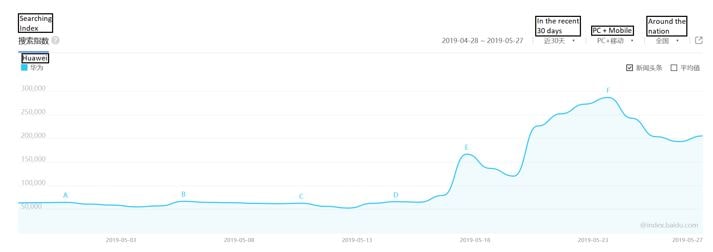
Concerning the data of Baidu Index, it shows that China’s telecom brand related searching rose dramatically in the last 30 days stright after the Huawei issue, and the ascending trend started right after Trump announcing raising the tariffs to China and later announcing to blacklist Huawei.
What do Chinese netizens say about Huawei issue in Weibo?
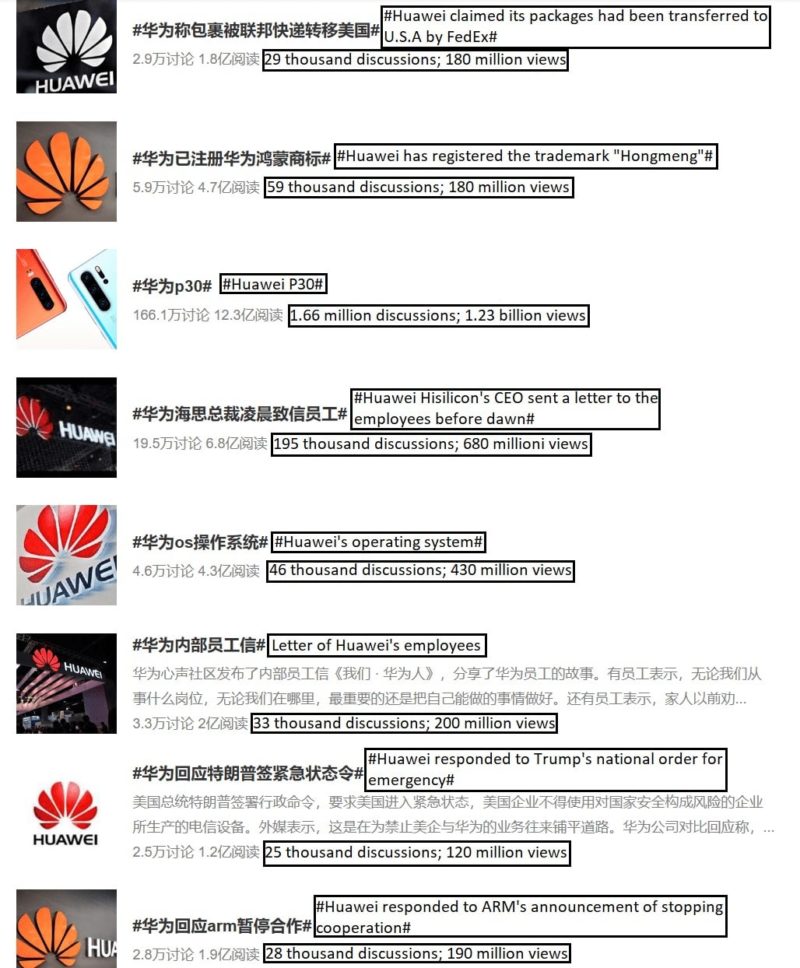
On Weibo, the Chinese twitter, there are also many topics relevant to Huawei’s sanction by Trump and the pause of cooperation with U.S. companies, and all the topics have above 10 thousand discussions and several hundred million views. The Huawei issue related to Huawei’s Hongmeng operating system and the letter of Huawei Hisilicon’s CEO are most viewed by Chinese netizens. Views’ number of a topic relevant to ARM rises tremendously to more than a hundred million in half a month. It seems that Chinese netizens are worried about the largest of China’s telecom company’s reaction to the situation.
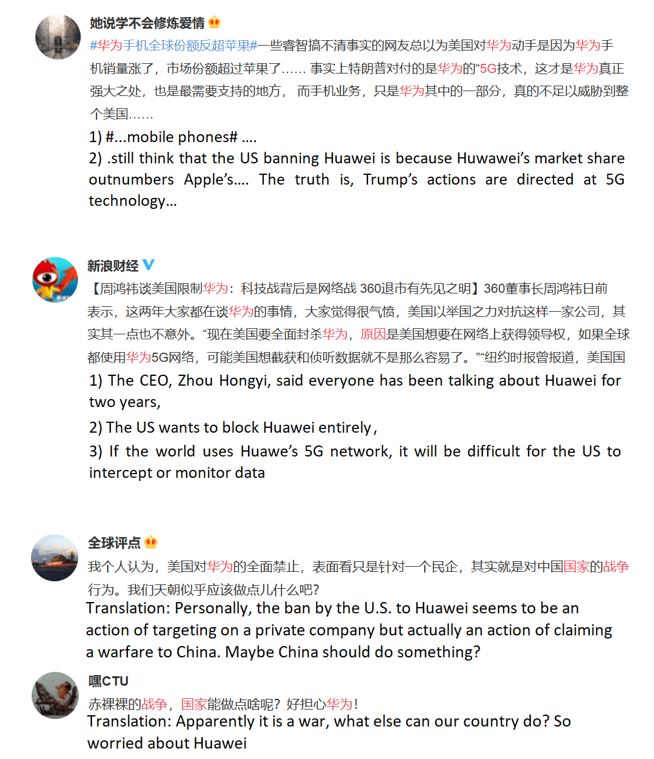
Many Chinese netizens think that 5G technology is the most important reason why Trump and the U.S. government ban Huawei; because once Huawei technology has the lead on the global 5G network, the U.S. government may lose the chance to monitor the world. US companies currently occupy almost 90% of the 4G market; these measures can also be a way not to miss the chance to get great benefits from the 5G industry.
WeChat users’ reaction to sanctions against Huawei
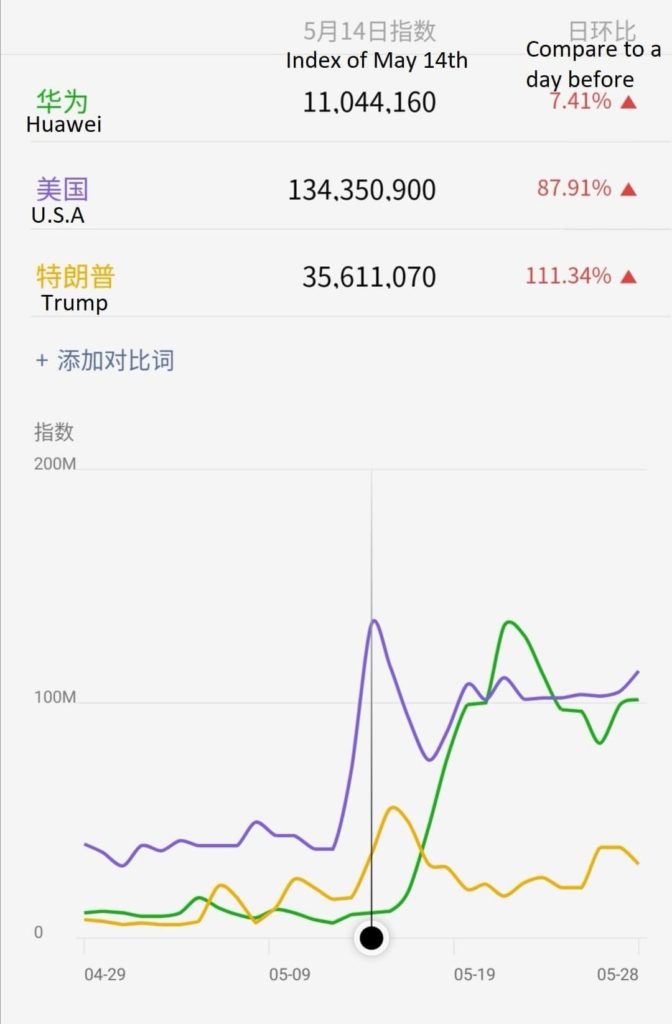
Data from WeChat Index, which is derived from the communication and information-sharing software WeChat in China, shows the search frequency of the Huawei brand increased after a search for words such as “the US” and “Trump.” Can be assumed that Chinese netizens didn’t interest into Trump’s sanction to Huawei until specific actions made by Google, ARM, Qualcomm, who announced to pause the business cooperation with Huawei, which may jeopardize Huawei’s business.
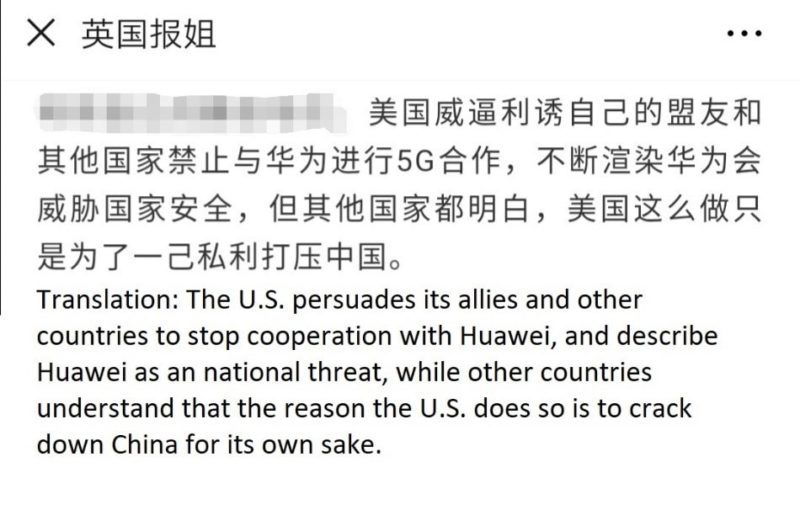
One of the KOLs on WeChat, which is a social communication media in China, thinks that the true reason of the Huawei issue is the U.S. wants to target on China in case China takes the leading position of the U.S. in economy and technology, which is deemed as a big threat to the U.S. government to maintain its economic benefits, and as Huawei is the representative of Chinese technology, the U.S. can hinder Chinese technological development by sanctioning Huawei. Some netizens who follow the KOL also believe this is a war between two countries, so the Chinese government should interfere more with the conflicts between Huawei and the U.S. government, and Chinese people should stay together to support the country and Huawei.
A Chinese question-answer forum: Shows us what Chinese netizens think of the Huawei issue
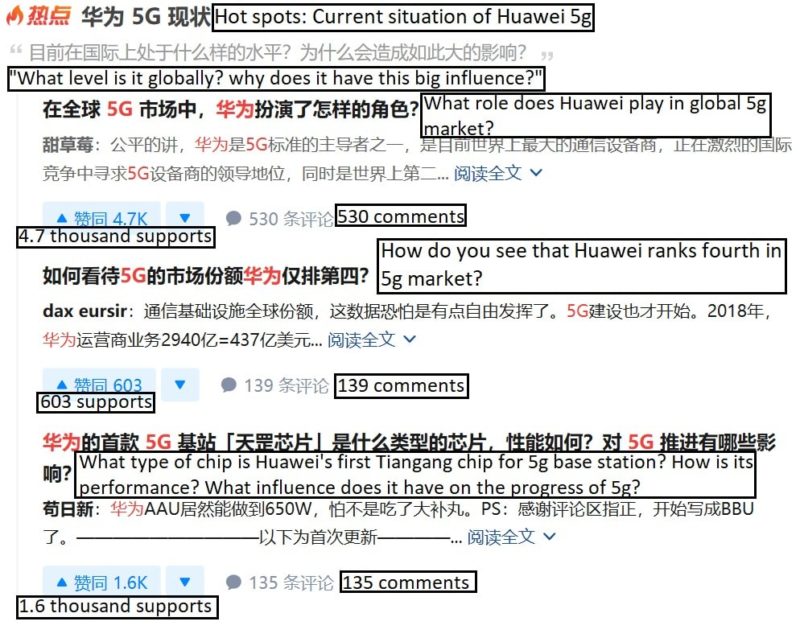
Plenty of Chinese netizens are discussing Huawei 5G technology because Huawei has already been one of the most advanced companies in the 5G industry, and Huawei 5G has already been the hot topic on Chinese question-answer forum Zhihu as showed above. But Huawei operating system and Huawei Hisilicon are also buzzing on the forum, and questions or topics about Huawei OS and Huawei Hisilicon are put forward by Chinese netizens.
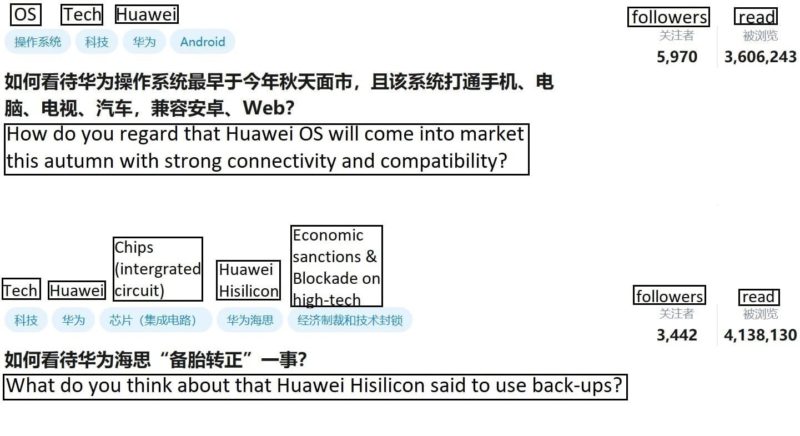
On Zhihu, there are several thousand netizens following the discussions about Huawei’s possible solutions to its difficulties, including the expectation of Huawei operating system and Huawei Hisilicon.
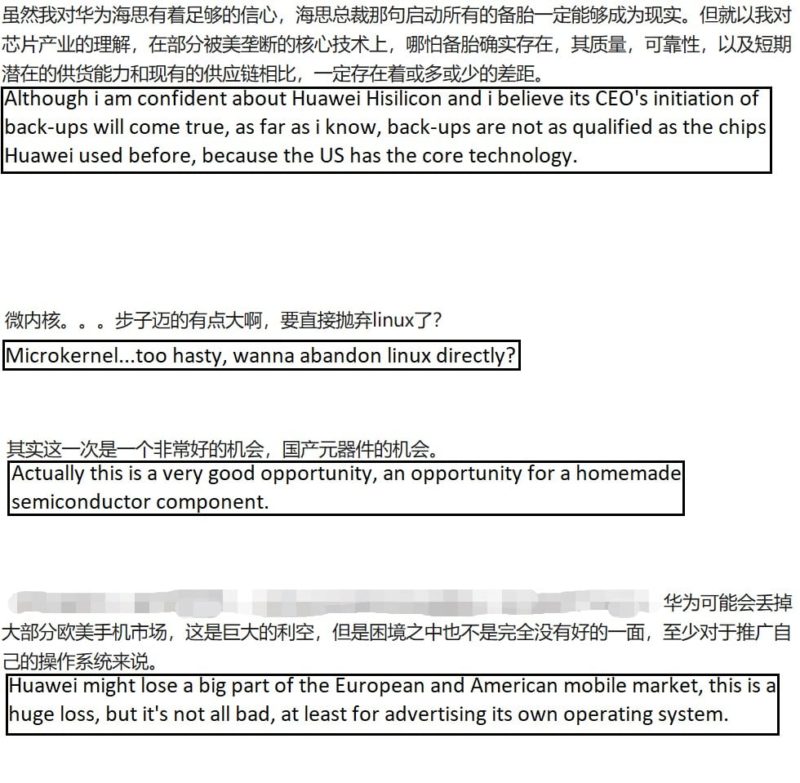
The answers are both optimistic and pessimistic: although it is easily expected that there are netizens optimistic about Huawei OS and Huawei’s Hongmeng OS can help Huawei overcome the Huawei ban issue because they believe Huawei has capital and technologies to support its research, there are also a number of netizens pointing out that there are limits of Hongmeng operating system and Huawei Hisilicon, but this is also the Sputnik moment for Huawei to get rid of its dependence on the U.S. technical support.
Huawei through the eyes of Chinese consumers: A contradiction in opinions
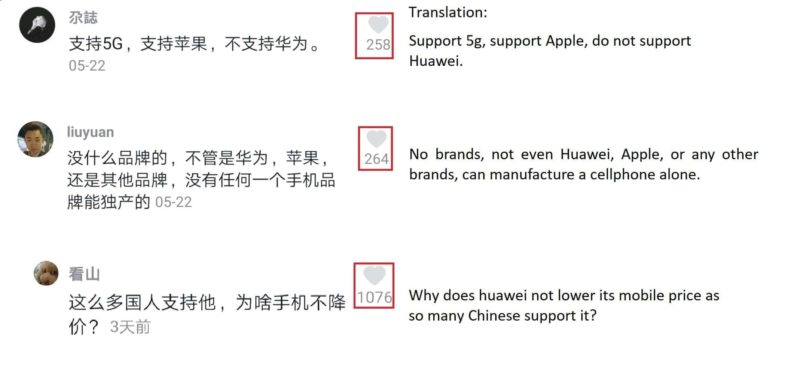
There are also comments that are suspicious about Huawei on the net. They have ideas that if Huawei wants to gain the support from Chinese citizens, then it needs to decrease the price of its products inside China; some Chinese netizens also point out that Huawei cannot continue its production alone.

Some netizens also criticize Huawei for leveraging patriotism for sales tactics. Since the incident, some netizens expressed Huawei just wants to use pity for marketing purposes.
Overall, Chinese netizens focus more on the point that the U.S. wants to hinder China, and therefore, it can gain leadership in the 5G industry, and Huawei 5G is the cause. There are both supporters and objectors of Huawei among Chinese netizens, and the main controversy is not whether Huawei can overcome the difficulty but whether it is patriotic to buy Huawei products.
Huawei 5G technology: What is the reason for Trump’s ban on Huawei?
Huawei 5G technology was developed as early as in 2009, according to the information released on its website. In 2017 and 2018, Huawei spent U.S$1.4 billion R&D expenditure on Huawei 5G technology. Huawei 5G technology is characterized by “simplified architecture” with simplified base stations to relay the signals and information in the form of the microwave. Currently, Huawei has been one of the most promising leaders in 5G technology, and Huawei has already tested its 5G technology successfully on broadcasting and telecommunication in several countries including Japan, Germany, and the UK.
Huawei’s main competitor in 5G technology is Qualcomm. In the Chinese Internet users’ eyes, this is the most likely reason behind the Huawei ban.
The future of Huawei: What is the forecast
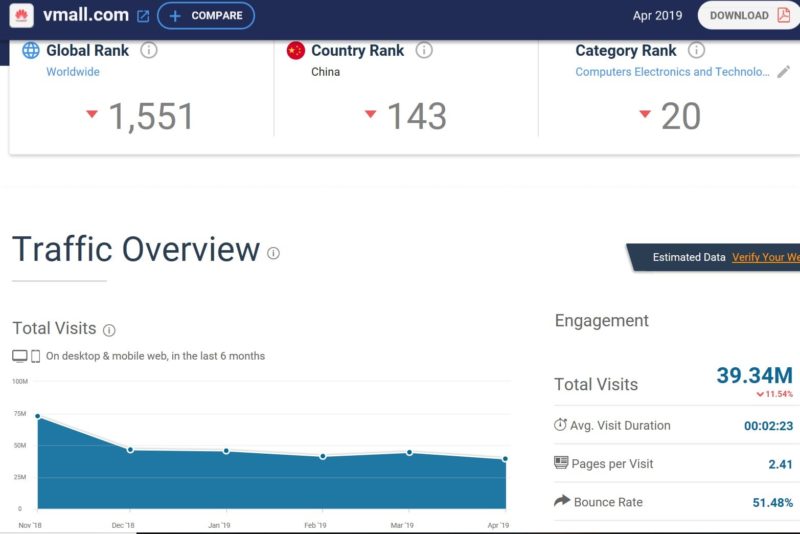
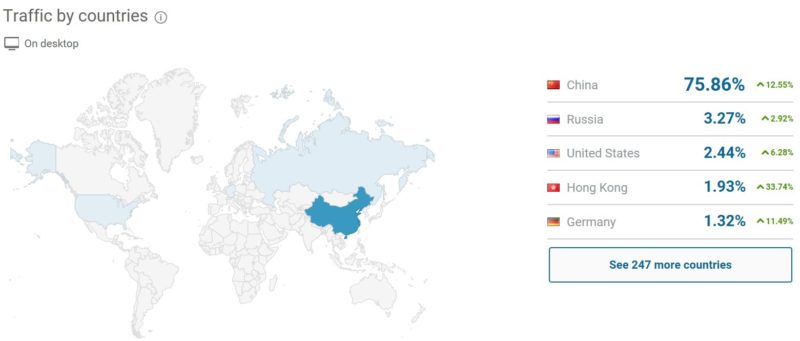
The data of Huawei Vmall that obtained from SimilarWeb shows that the traffic of Huawei online sales platform had experienced a downfall since Nov. 2018, even within the period of Huawei’s P30 mobile release.
However, Huawei CEO Ren Zhengfei is quite confident about the future of Huawei. Ren joined the interview held by a Chinese journalist and said that Huawei would win the battle with the U.S. government. He reckoned this is Huawei’s Sputnik moment and Huawei would overcome. “I never thought we, Huawei, would die.” Said Ren. “We think we should analyze the problems we have: which problem we can neglect, which problem we should focus on. Then we will achieve victory. The U.S. has no way to do with some high-tech products because we entirely count on ourselves.”
Huawei’s saviors: Huawei operating system and Huawei Hisilicon
Ren’s confidence about Huawei is obvious for Chinese netizens, as they launched several discussions on social media platforms about the solutions to the difficulties that Huawei encounters. Most people thought that the Hongmeng operating system, which is developed by Huawei itself, and the Kirin chip in China that is invented and manufactured by Huawei Hisilicon (which is Huawei’s subsidiary) can help Huawei to get rid of the impact of being banned by the U.S. In addition, since Huawei is a China’s telecom company, mobile business is just a part of it; and Huawei can give up the mobile business and continue to survive without it. A phrase called “extreme survival” is used to illustrate the current status of Huawei, and this phrase is also often associated with the Huawei’s issue in the Chinese internet.
Can Huawei survive from “Huawei ban” by developing Hongmeng OS and Huawei Hisilicon?
Currently, all of Huawei’s mobiles are equipped with an Android system provided by Google. Besides, Qualcomm and ARM are the chip supporters of Huawei: Qualcomm provides chips to Huawei for its most mobile products, and ARM provides the architectures for Huawei to design and manufacture its Kirin chip in China. But now Google, Qualcomm, ARM have already stopped cooperation with Huawei, which is a tremendous threat to Huawei technology. Although the Android system is open source, Huawei’s mobiles will not receive the following support and update services on the Android system from Google. In addition, Huawei cannot purchase chips from Qualcomm or design its chips by using the new structures from ARM.
However, Huawei still has opportunities to overcome. Huawei just announced that it had developed a Hongmeng operating system as the alternative of the Android system on condition that Google will not provide the Android system. Also, ARM has authorized Huawei to use its existed architectures permanently without being affected by the U.S. government’s regulation, so Huawei Hisilicon can further develop Kirin chip in China.
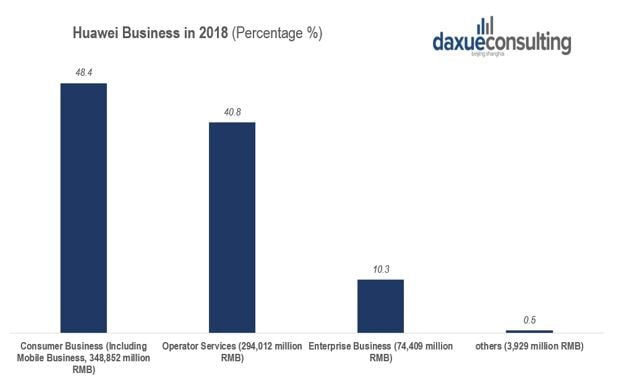
Huawei mobile business also accounts for only part of its business. According to Sohu, the mobile business takes up to 48.4% of all Huawei business, while there are more than 50% coming from other parts of Huawei Business. For example, operator services account for about 40% of Huawei business, and this may increase as Huawei 5G is expected to help Huawei obtain more market share in the sector of operator services. At present, Huawei 5G’s main competitor is Qualcomm 5G, which was tested last year and received unpleasant feedbacks.
The future of Huawei is promising. Nevertheless, either Hongmeng operating system and Kirin chip in China cost certain time to improve until they are fully qualified for the market that Huawei has. Although Ren said that Huawei operating system and Huawei Hisilicon have developed much enough to go to the market, time will tell whether the new Huawei technology is qualified in the market.
Author: Dennis Deng
Make the new economic China Paradigm positive leverage for your business
Do not hesitate to reach out our project managers at dx@daxue-consulting.com to get all answers to your questions


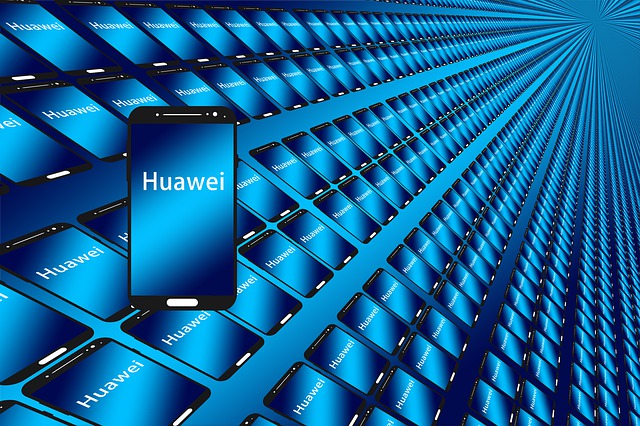
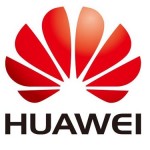


![[Podcast] China Paradigm 40: The future of Baidu, Google and other digital marketing insights in China](../wp-content/uploads/2019/05/podcast-digital-marketing-insights-China-150x150.jpg)
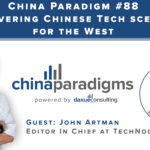

![[Podcast] China paradigm #23: How tech companies can engage consumers in China](../wp-content/uploads/2019/04/China-paradigm-23-China-business-podcast-150x150.jpg)
![[Podcast] China Paradigm #32: How can foreign tech companies succeed in China](../wp-content/uploads/2019/05/China-business-podcast-32-150x150.jpg)




